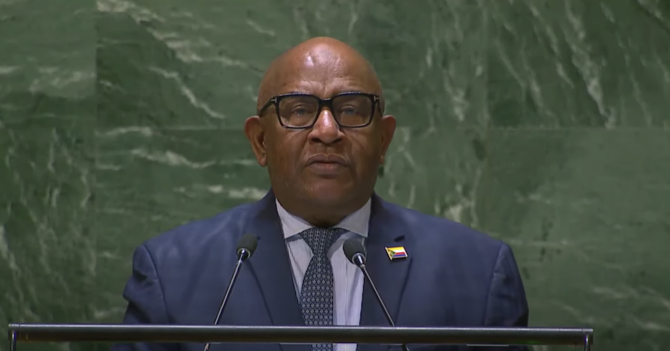LONDON: There is an “urgent” need for the international community to strengthen efforts to stabilize the Sahel region of Africa, the president of Comoros said on Wednesday.
Addressing the UN General Assembly, Azali Assoumani added that if unrest and terror are not contained, they have the potential to spread further afield on the African continent.
“Of course, first and foremost, it’s up to Africans to implement the social and economic development plan to better combat poverty and youth unemployment, especially to make sure young people don’t become hostages to all types of extremism,” he said.
“However, it’s the duty of the international community to support Africa in this, because our efforts need to be pooled if we’re to stand a chance of being effective.”
Assoumani praised the recent integration of the African Union into the G20, calling it a victory for both sides.
He said the decision “gives (Africa) hope, especially at a time when synergy of actions is needed to get our countries out of socioeconomic stalemate.”
Like many other global leaders at this year’s event, Assoumani called for “in-depth reform” of the UN system, saying the AU should have a permanent seat at the Security Council.
He also voiced concern over how the Russia-Ukraine conflict is impacting food security in the poorest parts of the world, especially Africa.
“Despite the fact we have immense arable lands, despite the fact we have qualified and competent labor aplenty, food insecurity continues to impact millions of people,” he said.
“Climate change and the numerous conflicts on the continent compound this situation, as does the Russia-Ukraine situation, which brought in its wake disruption of supplies of grain and fertilizer and an unprecedented inflation.”
Assoumani called on Africa’s partners and the international community to support development and the implementation of “far-reaching” reforms on the continent to help it overcome the challenges it faces.


‘Urgent’ need for world to help stabilize Sahel region: Comoros president
Short Url
https://arab.news/mu5ge
‘Urgent’ need for world to help stabilize Sahel region: Comoros president

- Addressing UN General Assembly, Azali Assoumani praises African Union’s integration into G20
- He calls for ‘in-depth reform’ of UN system, saying AU should have permanent seat at Security Council
Trump to remove Vietnam from restricted tech list: Hanoi
HANOI: US President Donald Trump told Vietnam’s top leader To Lam he would “instruct the relevant agencies” to remove the country from a list restricted from accessing advanced US technologies, Vietnam’s government announced Saturday.
The two leaders met in person for the first time at the White House on Friday, after Lam attended the inaugural meeting of Trump’s “Board of Peace” in Washington.
“Donald Trump said he would instruct the relevant agencies to soon remove Vietnam from the strategic export control list,” Hanoi’s Government News website said.
The two countries were locked in protracted trade negotiations when the US Supreme Court ruled many of Trump’s sweeping tariffs were illegal.
Three Vietnamese airlines announced nearly $37 billion in purchases this week, in a series of contracts signed with US aerospace companies.
Fledgling airline Sun PhuQuoc Airways placed an order for 40 of Boeing’s 787 Dreamliners, a long-haul aircraft, with an estimated total value of $22.5 billion, while national carrier Vietnam Airlines placed an $8.1 billion order for around 50 Boeing 737-8 aircraft.
When Trump announced his “Liberation Day” tariffs in April, Vietnam had the third-largest trade surplus with the US of any country after China and Mexico, and was targeted with one of the highest rates in Trump’s tariff blitz.
But in July, Hanoi secured a minimum 20 percent tariff with Washington, down from more than 40 percent, in return for opening its market to US products including cars.
Trump signed off on a global 10-percent tariff on Friday on all countries hours after the Supreme Court ruled many of his levies on imports were illegal.
The two leaders met in person for the first time at the White House on Friday, after Lam attended the inaugural meeting of Trump’s “Board of Peace” in Washington.
“Donald Trump said he would instruct the relevant agencies to soon remove Vietnam from the strategic export control list,” Hanoi’s Government News website said.
The two countries were locked in protracted trade negotiations when the US Supreme Court ruled many of Trump’s sweeping tariffs were illegal.
Three Vietnamese airlines announced nearly $37 billion in purchases this week, in a series of contracts signed with US aerospace companies.
Fledgling airline Sun PhuQuoc Airways placed an order for 40 of Boeing’s 787 Dreamliners, a long-haul aircraft, with an estimated total value of $22.5 billion, while national carrier Vietnam Airlines placed an $8.1 billion order for around 50 Boeing 737-8 aircraft.
When Trump announced his “Liberation Day” tariffs in April, Vietnam had the third-largest trade surplus with the US of any country after China and Mexico, and was targeted with one of the highest rates in Trump’s tariff blitz.
But in July, Hanoi secured a minimum 20 percent tariff with Washington, down from more than 40 percent, in return for opening its market to US products including cars.
Trump signed off on a global 10-percent tariff on Friday on all countries hours after the Supreme Court ruled many of his levies on imports were illegal.
© 2026 SAUDI RESEARCH & PUBLISHING COMPANY, All Rights Reserved And subject to Terms of Use Agreement.












